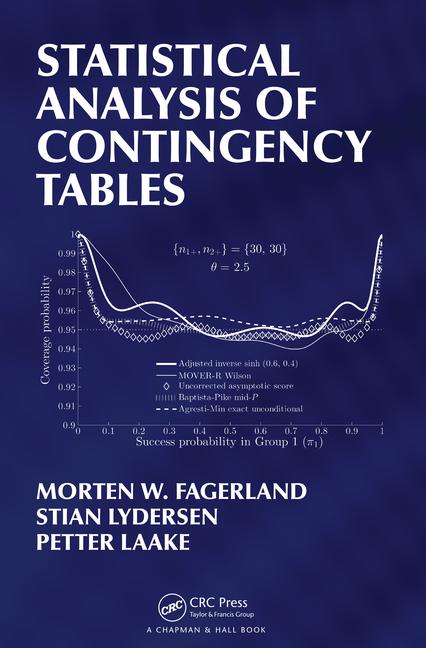

“The authors
provide an in-depth survey of the overwhelmingly large number of methods that
are now available for conducting statistical inference with contingency tables.
What sets this book apart from others is its detailed performance evaluations
of the confidence interval and significance testing methods, followed by
recommendations about what to use for various purposes. This book should be a
very useful reference for anyone who wants an overview of the relevant
literature (much of it quite recent) or who routinely needs to analyze
contingency tables.”
Alan Agresti, Distinguished Professor Emeritus, University of Florida
“This statistical text on the analysis of contingency tables has three outstanding features. It is comprehensive without being unwieldy; it maintains an ideal balance between theory and application; and it is consistently systematic. For each type of contingency table structure it deals with, it covers a variety of analytic methods, assesses the properties of each method and gives appropriate recommendations. Further, each section has a relevant, illuminative practical example. I highly recommended it for masters and doctoral students in statistics, biostatistics and epidemiology, instructors and researchers in those fields as well as applied researchers in the social sciences, psychology, public health, medicine and other fields requiring the analysis of discrete data.”
Karim F. Hirji, Fellow, Tanzania Academy of Sciences, Author of Exact Analysis of Discrete Data
“This encyclopaedic book deals comprehensively with statistical methods for data arranged as one and two dimensional contingency tables and stratified data. The detailed evaluation of the performance of various competing methods heeds recently developed as well as more traditional criteria. Numerous practical examples are given, mainly from the healthcare domain, alongside Matlab and R code for all the methods recommended. I strongly recommend the book both to statisticians and to researchers in health and social disciplines.”
Robert G. Newcombe, Emeritus Professor, Cardiff University, Author of Confidence Intervals for Proportions and Related Measures of Effect Size
“This 600+ page book comprehensively covers the analysis of one-, two- and three-dimensional (stratified) contingency tables. Such low-dimensional tables are the types of contingency tables that most researchers encounter in real life. The book is primarily for practitioners at Master’s and/or PhD level. This book is highly recommended because it covers over 250 analytic methods, includes up-to-date material typically only found in specialist journals, evaluates alternative analytic methods, makes recommendations for their practical use, and illustrates the use of the methods on real life data. A companion website provides Matlab- and R-code for almost all the methods described. The book is unique because it is so comprehensive and up-to-date, its chapters are to a large extent self-contained so that the analyst will find all they need to know in the relevant chapter without having to read the preceding chapters, and the recommendations make the book more practically useful than other texts. In summary, an essential book to own if you analyse low-dimensional contingency tables.”
John McDonald, Professor of Social Statistics (retired), University of Southampton